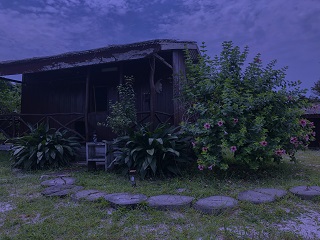 4:55 AM came early. My circadian rhythm is all out of whack with jetlag, time change and the body is deprived of sleep. Especially because we fished till 10 PM last night and didn’t get to bed till midnight. Though we weren’t scheduled for fishing here at Sette Cama Camp here in Gabon this morning until 5:30, I like to relax on my cabin porch and put back a coffee. I think I was awake even earlier due to the fact the birds were singing like they do on a Wisconsin spring morning. Its music to my ears.
4:55 AM came early. My circadian rhythm is all out of whack with jetlag, time change and the body is deprived of sleep. Especially because we fished till 10 PM last night and didn’t get to bed till midnight. Though we weren’t scheduled for fishing here at Sette Cama Camp here in Gabon this morning until 5:30, I like to relax on my cabin porch and put back a coffee. I think I was awake even earlier due to the fact the birds were singing like they do on a Wisconsin spring morning. Its music to my ears.
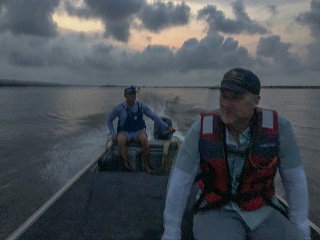 The guys strolled in gradually. Everyone was excited to fish but dragging some like me. There’s eight of us so we split into four boats and headed out to boat fish the Loango National Park estuary itself. I fished with Scott and the African Waters guide Oliver Santoro. It was twilight when we left the dock and as we drove along we could see shapes of forest buffalo and forest elephants on the horizons.
The guys strolled in gradually. Everyone was excited to fish but dragging some like me. There’s eight of us so we split into four boats and headed out to boat fish the Loango National Park estuary itself. I fished with Scott and the African Waters guide Oliver Santoro. It was twilight when we left the dock and as we drove along we could see shapes of forest buffalo and forest elephants on the horizons.
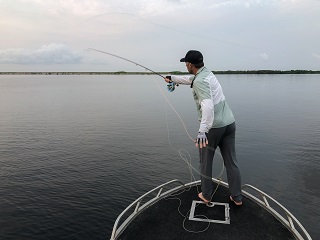 Here at the African Waters fishery of Sette Cama Camp in Gabon we fish two sessions a day – a morning and a night. We arrived late yesterday from the US so we only had the night session. Night sessions are done from the beach right at the mouth of the estuary usually from 6 PM until 10 PM. When it’s slow these hours are shortened but if it’s happening you may fish well into the night. Mornings sessions are usually fished from the boats inside the estuary from 5:30 AM till around 10. Then we have a lunch break and a relaxing afternoon. Naps are essential in order to be up early for the mornings and to be able to stay up late at night.
Here at the African Waters fishery of Sette Cama Camp in Gabon we fish two sessions a day – a morning and a night. We arrived late yesterday from the US so we only had the night session. Night sessions are done from the beach right at the mouth of the estuary usually from 6 PM until 10 PM. When it’s slow these hours are shortened but if it’s happening you may fish well into the night. Mornings sessions are usually fished from the boats inside the estuary from 5:30 AM till around 10. Then we have a lunch break and a relaxing afternoon. Naps are essential in order to be up early for the mornings and to be able to stay up late at night.
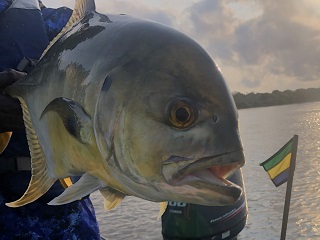 I kept topping off my Yeti and sipped it all the way up until first cast which was directly into a feeding frenzy. I stripped out my line and launched. My popper landed and I made two strips then greedily reached down for one last sip of coffee. With my Winston tight in my right hand and my Yeti in my left, a longfin jack exploded on my resting popper. The longfin took off so forcefully all I had to do was hold tight. The speedster hooked himself before the line slipped and it was battle on. A nice first cast of the day!
I kept topping off my Yeti and sipped it all the way up until first cast which was directly into a feeding frenzy. I stripped out my line and launched. My popper landed and I made two strips then greedily reached down for one last sip of coffee. With my Winston tight in my right hand and my Yeti in my left, a longfin jack exploded on my resting popper. The longfin took off so forcefully all I had to do was hold tight. The speedster hooked himself before the line slipped and it was battle on. A nice first cast of the day!
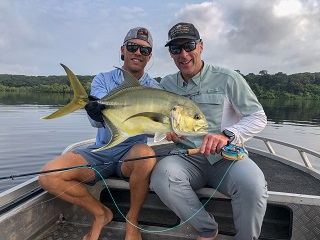 Two species of jack, the longfin and the Atlantic crevalle live here. Both chase baits and bust the surface best right at dawn which is why we get up so early. Jacks are feisty and any fish half their size gets chased down and eaten. This morning the action was slow. I got that first one then Scotty picked up another and a random one later. Overall the jack hunting was less than normal. We changed gears early on and went for snapper.
Two species of jack, the longfin and the Atlantic crevalle live here. Both chase baits and bust the surface best right at dawn which is why we get up so early. Jacks are feisty and any fish half their size gets chased down and eaten. This morning the action was slow. I got that first one then Scotty picked up another and a random one later. Overall the jack hunting was less than normal. We changed gears early on and went for snapper.
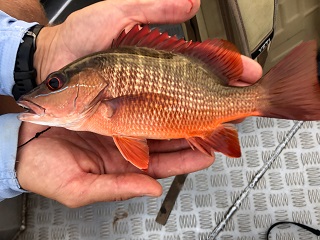 For snapper generally the front of the boat angler uses a popper and the angler in back fishes a Clouser. While the popper doesn’t catch every hungry fish it for sure wakes them up. Those that don’t eat it often fall for the Clouser. It’s an excellent teamwork way to fish.
For snapper generally the front of the boat angler uses a popper and the angler in back fishes a Clouser. While the popper doesn’t catch every hungry fish it for sure wakes them up. Those that don’t eat it often fall for the Clouser. It’s an excellent teamwork way to fish.
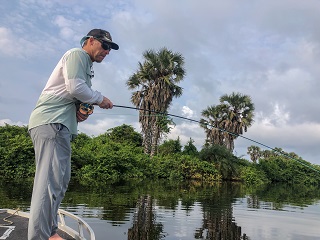 The most common fish we catch along the mangroves are these colorful gorean snappers. Goreans can reach about 15 lbs and the big guys show up on occasion. Today we caught mostly ones this size and one other snapper type, the mangrove jack. There’s a snapper species here called the African brown snapper and last trip I caught a few that may have been him but we could never be sure so I didn’t add him to the list. Hopefully I nail one this week and our fish whisperer friend of mine running camp, Ed Truter, can verify one for me.
The most common fish we catch along the mangroves are these colorful gorean snappers. Goreans can reach about 15 lbs and the big guys show up on occasion. Today we caught mostly ones this size and one other snapper type, the mangrove jack. There’s a snapper species here called the African brown snapper and last trip I caught a few that may have been him but we could never be sure so I didn’t add him to the list. Hopefully I nail one this week and our fish whisperer friend of mine running camp, Ed Truter, can verify one for me.
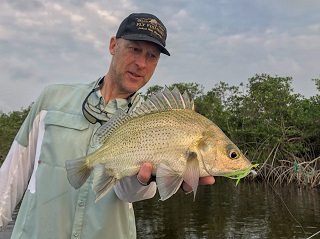 Scott and I managed one other species that’s not a snapper as well. This is the grunter. He’s like the popular and challenging shallow water grunter South Africans chase along the Garden Highway. That species is hard to get. This one is much easier. We got two today and I remember a few last trip as well. I can’t decide if there funny looking or not but they sure show some personality.
Scott and I managed one other species that’s not a snapper as well. This is the grunter. He’s like the popular and challenging shallow water grunter South Africans chase along the Garden Highway. That species is hard to get. This one is much easier. We got two today and I remember a few last trip as well. I can’t decide if there funny looking or not but they sure show some personality.
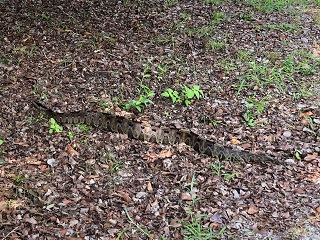 Oliver fished us hard this morning until 11. All the guys returned about the same time and the results were similar. Before lunch we got a look at an amazing snake one of the guides caught near camp three weeks ago. This is the well-mannered however deadly poisonous rhino viper. The hefty reptile gets his name because of some of the horns that stick up out of his head. It’s a beautiful snake but we stayed back while Oliver did the handling.
Oliver fished us hard this morning until 11. All the guys returned about the same time and the results were similar. Before lunch we got a look at an amazing snake one of the guides caught near camp three weeks ago. This is the well-mannered however deadly poisonous rhino viper. The hefty reptile gets his name because of some of the horns that stick up out of his head. It’s a beautiful snake but we stayed back while Oliver did the handling.
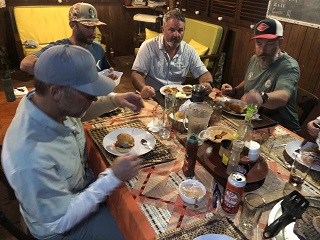 Tonight was one of our “prime tide” nights. The estuary currents were ripping between the hours of 9 PM and midnight which in turn meant we left camp after dinner at 8 PM and fished till things slowed down at 12:30 AM. These currents push huge balls of bait against the beach which of course is ideal for fly casting. These night shifts can be daunting when your behind on sleep like we all are from the last few days of travel. Luckily for most the crew, they got in long naps this afternoon and were ready to roll. Naturally with my usual sleeping issues, I couldn’t squeeze in a wink. But you know me, no matter how tired or delirious, I snap out of it when a fly rod is in my hand.
Tonight was one of our “prime tide” nights. The estuary currents were ripping between the hours of 9 PM and midnight which in turn meant we left camp after dinner at 8 PM and fished till things slowed down at 12:30 AM. These currents push huge balls of bait against the beach which of course is ideal for fly casting. These night shifts can be daunting when your behind on sleep like we all are from the last few days of travel. Luckily for most the crew, they got in long naps this afternoon and were ready to roll. Naturally with my usual sleeping issues, I couldn’t squeeze in a wink. But you know me, no matter how tired or delirious, I snap out of it when a fly rod is in my hand.
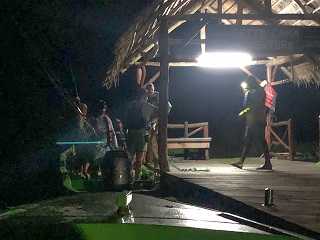 We left for the beach at the mouth of the estuary at 8 PM. Right after dinner. It’s a 20 minute boat ride in the pitch dark. While we have our three guides, its locals that drive the boats. There’s always concern of hitting a drifting log or even worse, a hippo or and elephant, but once your night eyes lock in, you can see better than you think.
We left for the beach at the mouth of the estuary at 8 PM. Right after dinner. It’s a 20 minute boat ride in the pitch dark. While we have our three guides, its locals that drive the boats. There’s always concern of hitting a drifting log or even worse, a hippo or and elephant, but once your night eyes lock in, you can see better than you think.
Before we knew it we were lined up 40 feet apart. Only seven of us made it out tonight. One of my guys has been sick and we’re all hoping a good night sleep will cure him. It was black dark but after last nights experience, everyone was doing it and getting the casts and the mends in order.
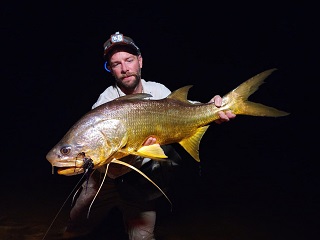 Action started quick. The guides, Mike and Chris tonight, timed tides perfectly. Almost everyone landed a threadfin in the first hour. It’s interesting because on my trip here in 2016 only two threadfin were landed all week. No doubt tides and location have a factor, but the main reason is African Waters have learned more on how to catch this species during the last decade.
Action started quick. The guides, Mike and Chris tonight, timed tides perfectly. Almost everyone landed a threadfin in the first hour. It’s interesting because on my trip here in 2016 only two threadfin were landed all week. No doubt tides and location have a factor, but the main reason is African Waters have learned more on how to catch this species during the last decade.
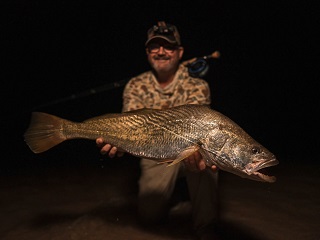 Two hours in the “threadies” were still eating. It was fun to say the least, but that’s when Randy pulled in a fish with a new suit. Randy caught a Senegalese Kob. As you can see its an extremely handsome fish and one I’ve yet to add to my list.
Two hours in the “threadies” were still eating. It was fun to say the least, but that’s when Randy pulled in a fish with a new suit. Randy caught a Senegalese Kob. As you can see its an extremely handsome fish and one I’ve yet to add to my list.
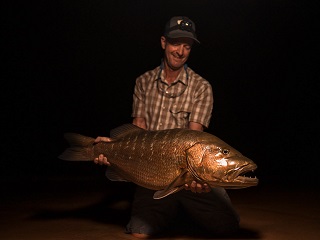 While I was casting away for my Kob and catching the occasional threadfin I went tight with something very heavy. We try to stop all these fish before they can accelerate and take you far. If they get deep in your backing they could shave your tippet on a rock and if they get out of control the sharks show up. Though my 12-weight bent like a 3, I was able to turn this fish without him reaching the backing. I landed my first African cubera of the trip. Catching big snappers on fly is one of my favorites. Stoked!
While I was casting away for my Kob and catching the occasional threadfin I went tight with something very heavy. We try to stop all these fish before they can accelerate and take you far. If they get deep in your backing they could shave your tippet on a rock and if they get out of control the sharks show up. Though my 12-weight bent like a 3, I was able to turn this fish without him reaching the backing. I landed my first African cubera of the trip. Catching big snappers on fly is one of my favorites. Stoked!
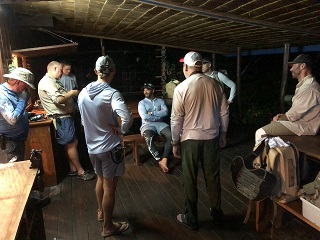 Not a tarpon was hooked tonight by anyone but we may have heard some splash in the darkness. You can’t be sure. I should mention there was some damage to equipment. Randy managed to break his 9-weight this morning landing a jack and tonight he had a huge fish run so far his backing broke. Ten minutes after that he hit his 12-weight with a Clouser and it shattered. Randy managed a Kob but it was a pricey prize!
Not a tarpon was hooked tonight by anyone but we may have heard some splash in the darkness. You can’t be sure. I should mention there was some damage to equipment. Randy managed to break his 9-weight this morning landing a jack and tonight he had a huge fish run so far his backing broke. Ten minutes after that he hit his 12-weight with a Clouser and it shattered. Randy managed a Kob but it was a pricey prize!
Fishing gradually slowed down after 11:30 PM and an hour later the action ended. Its amazing how the fish follow the tides. We wrapped it up at 12:30 and didn’t make it to bed until almost 2 AM. We’ll be tired when the alarms go off tomorrow but its all coming back to me – when you fish in Gabon you fish harder than on any trip you’ve ever done in your life!

That is some hard core fishing Jeff!
A mild correction… Jeff Smith got his ass handed to him when we had to do the long run down the beach chasing after a big tarpon the 2nd night which we never had a hope of stopping.
Thank you Mike! How could I forget that?!?! I’m sure with sleep deprivation and shortened time to get in all the details each blog there may be more things forgotten but I’ll do my best
Lost a fly line that night also 😝
Its not a real trip until you break something